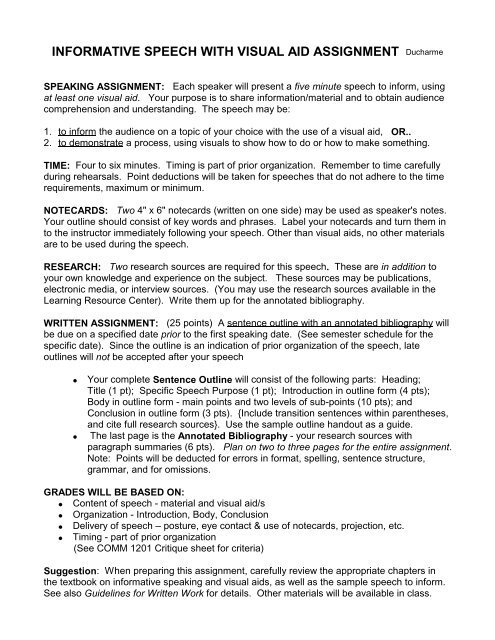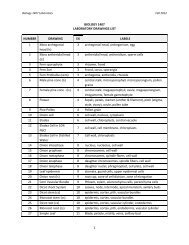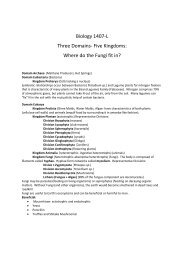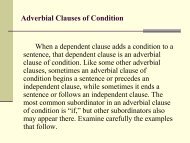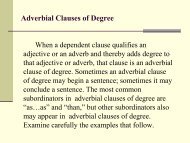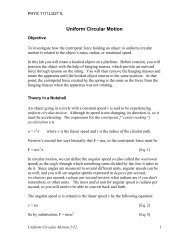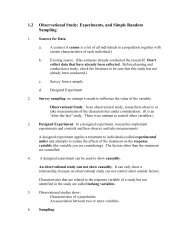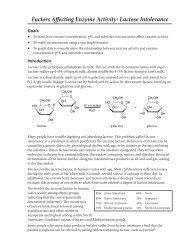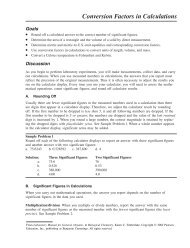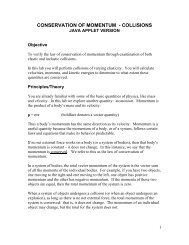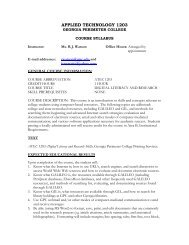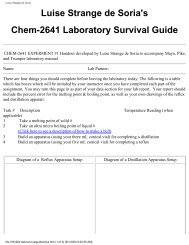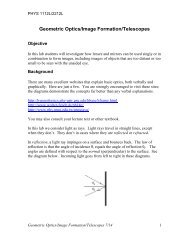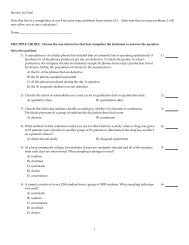INFORMATIVE SPEECH WITH VISUAL AID ASSIGNMENT
INFORMATIVE SPEECH WITH VISUAL AID ASSIGNMENT
INFORMATIVE SPEECH WITH VISUAL AID ASSIGNMENT
You also want an ePaper? Increase the reach of your titles
YUMPU automatically turns print PDFs into web optimized ePapers that Google loves.
<strong>INFORMATIVE</strong> <strong>SPEECH</strong> <strong>WITH</strong> <strong>VISUAL</strong> <strong>AID</strong> <strong>ASSIGNMENT</strong> Ducharme<br />
SPEAKING <strong>ASSIGNMENT</strong>: Each speaker will present a five minute speech to inform, using<br />
at least one visual aid. Your purpose is to share information/material and to obtain audience<br />
comprehension and understanding. The speech may be:<br />
1. to inform the audience on a topic of your choice with the use of a visual aid, OR..<br />
2. to demonstrate a process, using visuals to show how to do or how to make something.<br />
TIME: Four to six minutes. Timing is part of prior organization. Remember to time carefully<br />
during rehearsals. Point deductions will be taken for speeches that do not adhere to the time<br />
requirements, maximum or minimum.<br />
NOTECARDS: Two 4" x 6" notecards (written on one side) may be used as speaker's notes.<br />
Your outline should consist of key words and phrases. Label your notecards and turn them in<br />
to the instructor immediately following your speech. Other than visual aids, no other materials<br />
are to be used during the speech.<br />
RESEARCH: Two research sources are required for this speech. These are in addition to<br />
your own knowledge and experience on the subject. These sources may be publications,<br />
electronic media, or interview sources. (You may use the research sources available in the<br />
Learning Resource Center). Write them up for the annotated bibliography.<br />
WRITTEN <strong>ASSIGNMENT</strong>: (25 points) A sentence outline with an annotated bibliography will<br />
be due on a specified date prior to the first speaking date. (See semester schedule for the<br />
specific date). Since the outline is an indication of prior organization of the speech, late<br />
outlines will not be accepted after your speech<br />
• Your complete Sentence Outline will consist of the following parts: Heading;<br />
Title (1 pt); Specific Speech Purpose (1 pt); Introduction in outline form (4 pts);<br />
Body in outline form - main points and two levels of sub-points (10 pts); and<br />
Conclusion in outline form (3 pts). {Include transition sentences within parentheses,<br />
and cite full research sources}. Use the sample outline handout as a guide.<br />
• The last page is the Annotated Bibliography - your research sources with<br />
paragraph summaries (6 pts). Plan on two to three pages for the entire assignment.<br />
Note: Points will be deducted for errors in format, spelling, sentence structure,<br />
grammar, and for omissions.<br />
GRADES WILL BE BASED ON:<br />
• Content of speech - material and visual aid/s<br />
• Organization - Introduction, Body, Conclusion<br />
• Delivery of speech – posture, eye contact & use of notecards, projection, etc.<br />
• Timing - part of prior organization<br />
(See COMM 1201 Critique sheet for criteria)<br />
Suggestion: When preparing this assignment, carefully review the appropriate chapters in<br />
the textbook on informative speaking and visual aids, as well as the sample speech to inform.<br />
See also Guidelines for Written Work for details. Other materials will be available in class.
SUGGESTIONS FOR THE <strong>INFORMATIVE</strong> <strong>SPEECH</strong> <strong>ASSIGNMENT</strong><br />
TOPIC SELECTION:<br />
Select your own subject, keeping in mind the purpose of the speech, the interests of the audience, and<br />
your own interests. A list of suggested topics will be available in class. Some possibilities might be:<br />
Special experience: Travel, a summer job, living in a foreign country, military experience, a pet.<br />
Hobbies and interests: An arts or craft project, yoga, scuba diving, karate, rock climbing, camping,<br />
cooking, fishing, violin, a collection. These often make interesting demonstration speeches.<br />
Subject that you are familiar with: This may involve a place, job, machine, project, organization, or<br />
special training that you have had<br />
Subject that you would like to know more about: Iridology, Tae kwon do, astrology, cryonics,<br />
karma, acupuncture, Buddhism, Loch Ness<br />
Life of an outstanding individual: For example, Joan of Arc, Mark Twain, Dr. Albert Schweitzer,<br />
Madame Curie, Dr. George Washington Carver<br />
Topic of health, social, political or cultural interest : Cardio-pulmonary resuscitation, diet, a<br />
certain disease, Big Brothers, Coca Cola, chiropractic, voting, drinking water, the stock market.<br />
Topic of local, national, or international interest: MARTA, road rage, El Nino, foreign adoption<br />
Also: See text chapters for more suggestions and ideas.<br />
POINTS TO REMEMBER:<br />
• Do not select a subject that is too broad for a 4 to 6 minute speech. For example, the<br />
supernatural or U.S. presidents would be too much to handle within the time limitations.<br />
• Narrow or limit your topic appropriately. Since you cannot tell everything about your subject,<br />
you will have to be selective in the material that you present.<br />
• Do not select a controversial subject for a speech to inform. You may likely end up convincing<br />
instead of informing. Consider reserving such a topic for your persuasive speech instead.<br />
• Approach ordinary subjects from a personal perspective. Perhaps you have helpful ideas<br />
about familiar topics such as moving, sororities, time management, job interviews, handling stress.<br />
• Organize your material in a logical sequence. This will make it easier for you to present and for<br />
the audience to follow you. Demonstration speeches should have visual aids to display for each<br />
essential step of the process. See your instructor for special guidelines for a demonstration speech.<br />
• Cite your sources completely. It is necessary to tell the sources that you researched for your<br />
information. This credits them properly, and enhances your credibility.<br />
• Rehearse carefully. If possible, record your speech and listen to or watch the tape. Present to it<br />
others for practice. Welcome constructive criticism and positive feedback.<br />
• Practice with the materials that you will actually use during your presentation. Using the visual<br />
aids and finished notecards will help you feel more comfortable. Know your materials well enough<br />
so that you become less dependent upon your notes. This will help you to improve both your eye<br />
contact and your sincere communication with the audience.<br />
• Time your speech carefully during rehearsal. Timing is part of prior planning & organization.<br />
Adjust according to the results.<br />
• Be confident! Remember that you most likely know more about this subject than your audience.<br />
Approach your presentation with the idea of sharing this information with us.<br />
infospch7e


